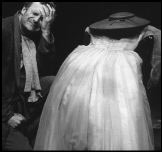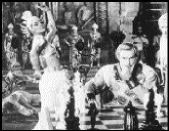KILLING SISTER GEORGE
Theatre Under the Influence, Union Garage, 1418 10th, 325-6500, $12 8 p.m. Thurs.- Sat. ends Sat., June 8
FRANK MARCUS’ play about a boozy, brutal dyke who delights in humiliating her lover was likely to have comforted as much as shocked audiences when it premiered in 1965. Like its near contemporary, The Boys in the Band, the play exploits popular preconceptions of gays as neurotic, angry, and morally lame. What redeems this twisted and funny snapshot of a tectonic time is that it uses dated archetypes for the larger aim of exploding social facades.
Sister George is the nursemaid nun of a syrupy radio serial. But there’s nothing wholesome about the actress who plays her: June Buckridge, a butch terror in comfortable shoes. The frilly dolls and lace that litter her flat aren’t hers (“I collect gin bottles,” June quips); they belong to Childie, her submissive partner who, when June commands, will eat the butt of a cigar.
June’s cruel punishments intensify once she learns that, for the sake of ratings, her character on the soap is scheduled for death. Mrs. Mercy Croft, the prim programming executive, explains that Sister George’s fate reflects how “old values have become outdated.” The loss of the character, however, will strip June bare, leaving her to cower behind the “humanitarian” awards granted to her alter ego. As June’s anxiety rises, so her conflict with Childie escalates. Even June and Childie’s party masquerade as Laurel & Hardy reveals the sadism that lurks behind an innocent face.
As June, Shannon Kipp is formidably sneering, and Deniece Bleha’s Childie is complex enough to be more than a tea-bearing doormat. Alice Miller Larkin, as Mercy, squeaks her cautions dressed like Queen Elizabeth, and Rachel Solomon is a biting Madame Xenia, the psychic next door. Even so, we live on the other side of a social transition (consider Rosie O’Donnell), and connecting with this archaic material presents a challenge for performers. What makes this neglected work worth another look is how it challenges us as well.








